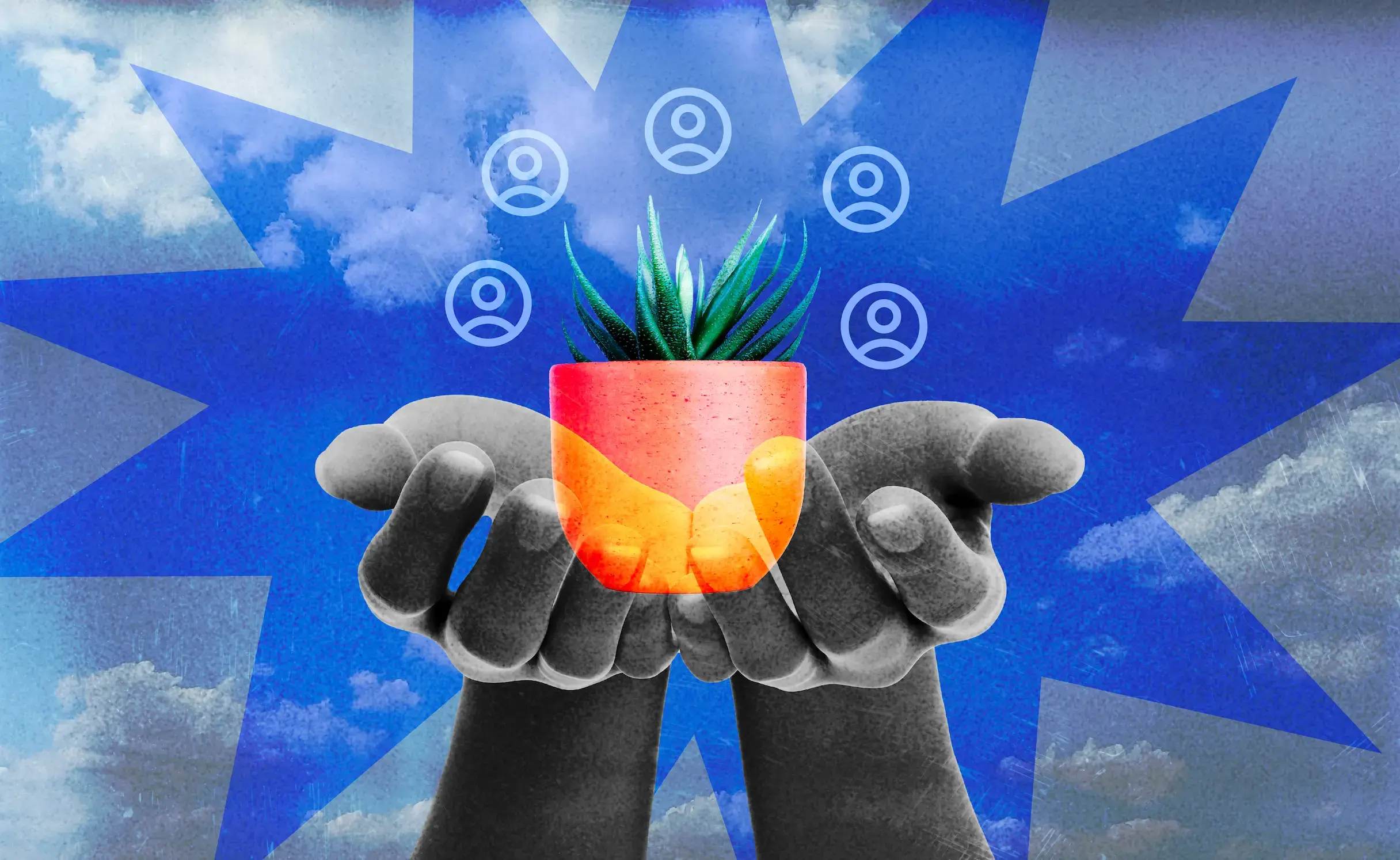The Art of Lead Nurturing: How AI Is Revolutionizing B2B Marketing
Approx 6 min. read

Two men sit at a bar one evening, each sharing their marketing strategies. "It's all about staying in their face," the first man says. "Call, text, show up at their doorstep—apply pressure; you can’t let them forget you."
The second man leans back with a smirk. "Sure, that's one way. But I prefer to let them come to me. If I create content that genuinely helps them, they'll trust me and reach out themselves. It's not about being unforgettable—it's about being the one they remember when they need a solution."
And just like that, the essence of inbound marketing is captured. This approach, championed by HubSpot's ex-CEO Brian Halligan, focuses on building relationships and gently guiding prospects through their buyer's journey—a process we call lead nurturing. Think of it like making a new friend: you take the time to get to know them, understand them, and build trust.
Just as in real life, where we're more inclined to help a friend than a stranger, customers are more likely to choose a brand they trust. As marketers and business owners, it's our responsibility to provide an experience that feels personal and attentive. That's the heart of effective lead nurturing.
Since lead nurturing first made its debut over a decade ago, the bar for what constitutes effective nurturing has risen significantly—especially in B2B SaaS, where customer expectations are high and buyer journeys are complex. To stay ahead, you need something special. Enter AI.
What is AI and How Does It Enhance Lead Nurturing?
Simply put, AI is a simulation of human intelligence, capable of performing tasks and making decisions that would typically require human thought. In a more figurative sense, AI is like the 21st-century version of the “man in the box” joke—where people assumed a tiny man lived inside the radio because they didn’t understand the technology.
For SaaS companies aiming to elevate their lead nurturing efforts, AI is like that tiny man, working behind the scenes to analyze data, predict outcomes, and personalize interactions. This advanced technology, built on Large Language Models (LLMs), can process vast amounts of customer data in record time and apply it in various ways to benefit your company.
This allows sales teams to focus their efforts on high-quality, qualified leads, increasing the chances of conversion. It’s like having a digital assistant that not only understands your prospects’ needs but anticipates them, delivering the right message at the perfect moment. In this blog, we’ll explore how AI plays a pivotal role in lead nurturing and how SaaS companies can harness its power.
AI-Powered Lead Scoring and Qualification
Imagine having a crystal ball that tells you which leads are most likely to convert. That’s essentially what AI-powered lead scoring and qualification offer. By leveraging artificial intelligence, businesses can automate the lead scoring process, assigning scores based on a myriad of factors such as demographics, online behavior, and engagement levels. This allows sales teams to focus their efforts on high-quality leads, increasing the chances of conversion.
AI doesn’t just stop at scoring; it also excels in lead qualification. By analyzing vast amounts of data, AI can identify potential customers who are more likely to convert, allowing businesses to tailor their marketing and sales efforts accordingly. This targeted approach ensures that marketing and sales teams are not wasting time on leads that are unlikely to convert, making their efforts more efficient and effective.
Predicting Customer Behavior with Lead Scoring
One of AI’s most impressive capabilities is pattern recognition. AIs can learn, optimize their performance, and predict customer behaviors with remarkable accuracy—given the right data. AI's ability to predict customer behavior also revolutionizes the lead generation process, making it more efficient and effective.
Powered by machine learning algorithms, AI can sift through large datasets to identify which leads are most likely to convert, which ones need more nurturing, and which might be at risk of dropping off. This data comes from various sources, like website interactions, email responses, and purchase history. After going through this, AI can then identify patterns and correlations that might not be immediately obvious to human analysts.

For example, AI might determine that a lead who frequently engages with product-related content and promptly opens emails is more likely to convert than one who occasionally visits the website. Or it might recognize that leads who repeatedly visit the pricing page without signing up are on the verge of conversion and just need a personalized follow-up to close the deal.
These predictive insights allow SaaS companies to tailor their lead nurturing strategies to individual prospects, rather than relying on a one-size-fits-all approach.
Personalizing Content for Lead Nurturing
There’s a reason why content that strikes the right chord resonates with us—personalization works. In your lead nurturing strategy, this means delivering messages and offers that align with individual preferences.
AI plays a crucial role here as well. By analyzing customer data and identifying patterns, AI can present content most relevant to a lead’s specific needs and interests. For instance, if a lead frequently browses articles about a particular feature of your product, AI can suggest related content or offers that highlight that feature, keeping the lead engaged and interested.
Think of how Spotify curates custom playlists based on your listening history. That personalized touch is one of the reasons people love Spotify and happily pay for it.
Enhancing Lead Generation Efforts with AI
Lead generation is the lifeblood of any SaaS company, and AI is revolutionizing this critical process. By providing valuable insights into customer behavior and preferences, AI-powered lead-generation tools can identify patterns and trends that inform lead-generation strategies. This means businesses can craft more effective campaigns that resonate with their target audience.
AI also plays a crucial role in personalizing marketing and sales efforts. By analyzing data, AI can help businesses tailor their messages to individual leads, increasing the chances of conversion. Additionally, AI-powered lead generation tools can automate repetitive tasks, freeing up valuable time for sales and marketing teams to focus on high-value activities. This not only enhances efficiency but also ensures that lead-generation efforts are more strategic and impactful.
Automating Engagement
Automation brings efficiency and instant feedback. It can also tailor responses to suit the user, all of which help maintain engagement.

For example, chatbots from platforms like Drift and Intercom handle routine queries in real-time, freeing up human agents to focus on more complex issues. AI-powered customer support platforms automate ticketing and response processes, ensuring support requests are managed efficiently. Automated email systems, like HubSpot, offer features such as:
-
Personalized email campaigns, where emails are sent based on user preferences and demographics.
-
Behavioral triggers. For instance, if a lead downloads an eBook or visits a specific page, certain emails are triggered.
-
Re-engagement campaigns, where emails are sent to leads who haven’t interacted with your content in a while.
How to Integrate AI Into Your Existing Lead Nurturing Campaign
So, how do you effectively integrate AI into your company’s lead nurturing campaign?
-
Assess Your Needs and Goals: Evaluate your current lead nurturing processes. Identify pain points that need resolving and areas where AI can add value. Then, set clear, measurable goals for what you hope to achieve.
-
Choose the Right Tools: Research and select AI tools that align with your goals. There are various AI-powered platforms available for different aspects of lead nurturing, including predictive analytics, content recommendations, and automation. Ensure your sales team is involved in the selection process to enhance collaboration and effectiveness. Look for tools that integrate seamlessly with your existing CRM and marketing systems.
-
Implement in Phases and Test: Gradual implementation helps manage risks and allows for adjustments if necessary. Start with one aspect, like lead scoring, and gradually expand to other areas such as personalized content recommendations or automated engagement.
Measuring the Success of AI-Powered Lead Nurturing
Understanding the effectiveness of your AI-powered lead nurturing strategy is necessary for continuous improvement. Businesses can measure success using various metrics such as lead conversion rates, sales revenue, and customer satisfaction. These metrics provide a clear picture of how well your lead nurturing strategies are performing.
AI-powered analytics tools take this a step further by offering detailed insights into the performance of lead nurturing campaigns. These tools can identify areas for improvement, allowing businesses to optimize their strategies accordingly. By continuously measuring and refining their AI-powered lead nurturing efforts, businesses can ensure they are always moving towards better results.
Common Pitfalls to Avoid When Using AI

-
Over-reliance: AI is powerful, but not infallible. Avoid relying solely on AI without human intervention. Always have a strategy in place to review and validate AI-generated insights.
-
Ignoring Customer Experience: While AI can automate and optimize many processes, don’t lose sight of the human element. Always consider how your AI tools impact the overall customer experience. Test durability from a customer perspective periodically.
-
Neglecting Data Quality: Poor-quality data can lead to inaccurate AI predictions and recommendations. Ensure your data is clean, complete, and up-to-date. Regularly audit your data to maintain its integrity.
The Future of Lead Nurturing with AI
The future of lead nurturing with AI is nothing short of exciting. As AI technology continues to evolve, we can expect to see even more sophisticated tools and strategies emerge. AI-powered lead nurturing will become increasingly personalized, with businesses using AI to tailor their marketing and sales efforts to individual leads in ways we can only imagine today.
Moreover, AI-powered lead nurturing will become more integrated with other technologies, such as CRM and marketing automation platforms. This integration will enable businesses to streamline their lead nurturing processes, improving overall efficiency and effectiveness. The future holds endless possibilities, and those who embrace AI in their lead nurturing strategies will undoubtedly lead the way.
Conclusion
As the two men leave the bar, the first man gains a new understanding of engaging with prospects. He realizes that while he might be successful in grabbing attention, his leads may not remember him for the right reasons. All that pressure—but at what cost?
Building relationships based on trust and mutual respect by offering valuable help makes you indispensable. It makes you the solution prospects seek out when they’re ready. When you combine this approach with the power of automation and AI, you’re not just waiting for leads to come to you—you’re guiding them every step of the way to becoming long-lasting customers.
At EverWonder, inbound marketing is our Roman empire. We’re passionate about marketing strategies that attract leads and nurture them into loyal customers. If you're curious (and we hope you are), reach out to us, and we'll guide you every step of the way.
Related posts
Food for thought.

B2B Lead Nurturing: The Power of Segmentation & Full-Funnel Activation
by Conor Ebbs

Mastering SEO Performance Marketing: A B2B Guide to Smarter Growth
by The Ever Wonder Team